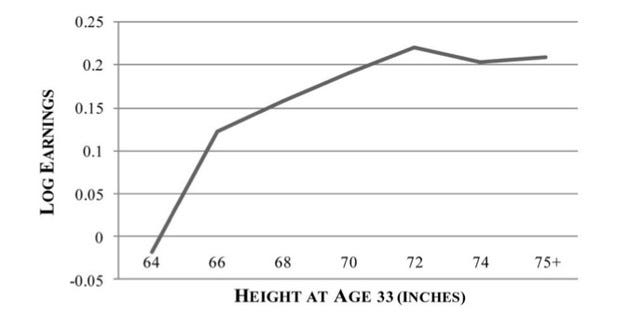# Exploring the Connection Between Height and Earnings Potential
Written on
Chapter 1: Understanding Height and Income
The assertion that "taller individuals earn more" is a topic worth exploring. But is there any truth to this claim, and can it be manipulated for personal gain?

Consider this: does a shorter person earn less than a tree? Is their income directly influenced by their height? Height is a trait that is both genetic and environmental, making it a notable characteristic that can impact various aspects of life, from attractiveness to financial success.
Numerous claims circulate online suggesting height affects:
- Annual income
- Chances of becoming a U.S. President
- Susceptibility to injuries
- Life expectancy
- Overall happiness
- Dominance
- Health
There’s even a troubling group of individuals, self-referred to as "shortcels," who believe that their height is a barrier to romantic relationships. However, they often overlook personal shortcomings unrelated to height.
What does the research indicate? Various studies have investigated the correlation between height and these factors. Is our success and well-being merely a function of how far our heads rise above the ground?
Does being taller genuinely equate to higher earnings? And can those of us who are shorter find ways to enhance our financial outcomes?
The Height-Money Link: A Deep Dive
The consensus is clear: taller individuals generally earn higher salaries, as supported by multiple studies. However, this is just the beginning of the inquiry. This raises several questions:
- Is there a cognitive association at play? Are taller individuals perceived as more intelligent?
- Does this advantage stem from childhood or manifest only in adulthood?
- Could it be linked to noncognitive skills, such as superior social capabilities and increased self-confidence?
Research conducted by Andreas Schick and Richard H. Steckel in 2015 indicates that the earnings advantage of taller individuals is rooted in their childhood, particularly linked to one key factor—nutrition.
Interestingly, the financial benefit of height seems to plateau at just below six feet, meaning that beyond a certain height, additional inches do not lead to higher earnings.

This does not imply that everyone under six feet suffered from malnutrition as children. However, children with inadequate nutrition may experience both physical and mental developmental challenges, resulting in shorter stature and potentially lower cognitive abilities.
Additional support comes from a study by Nicola Persico, Andrew Postlewaite, and Dan Silverman, which found that income disparities are more closely tied to height during adolescence than to current height. For those over 20, gaining extra height will not necessarily increase earning potential, even if one were to experience a sudden growth spurt.
Unusual Correlations: Shark Attacks and Ice Cream
In an unexpected twist, shark attacks correlate with ice cream sales. Higher ice cream consumption coincides with increased shark attacks—not because ice cream attracts sharks, but because both rise during the summer.
Similarly, the interplay between height and earnings involves both cognitive and noncognitive factors that are largely shaped during adolescence. Taller teenagers often exhibit greater social skills and academic success, resulting in better job prospects.
Thus, while height may improve the likelihood of earning more, it does not appear to be a direct cause; rather, those with better nutrition and social confidence are more likely to reach their full height potential and command higher salaries.
Maximizing Earning Potential: Beyond Height
The previous discussion reveals that height's influence on income primarily relates to teenage years. By the time many enter the workforce, a late growth spurt is unlikely to confer any advantage.
However, there are alternative strategies for enhancing earning potential:
- Attractiveness: Research shows that attractive individuals tend to face lower fines and enjoy better hiring prospects. Enhancing attractiveness can yield a financial equivalent of a 10% salary boost.
- Confidence: The social skills that often accompany height can be cultivated later in life through public speaking classes, volunteer work, or other opportunities that develop communication abilities.
- Fashion: While we can't increase our height, we can create an illusion of it. Wearing tailored clothing, lighter colors, and vertical stripes may enhance perceived height and boost confidence, potentially leading to salary increases.
Ultimately, while height does have a connection to success and financial outcomes, it’s not solely about how tall one stands. Factors such as nutrition, socioeconomic background, and the development of social skills during formative years play significant roles.
Shorter individuals can focus on improving their attractiveness and confidence to achieve comparable financial rewards. Instead of relying on shoe lifts, investing in public speaking and physical fitness may offer more substantial benefits.
Chapter 2: The Evidence Behind Height and Earnings
How Your Height Affects Your Salary - YouTube
Explore how height influences salary across various professions and demographics, offering insights into the underlying reasons.
Height and Income Analysis - Do Taller Employees Get Paid More? - YouTube
This video delves into studies examining the impact of height on income, discussing whether taller employees truly earn more in the workplace.